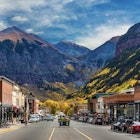
Three sustainable ways to experience the Everglades
Nov 25, 2019 • 4 min read

The Florida Everglades is home to the largest mangrove forest in North America © Mariakray / Getty
Spanning 1.5 million acres,​ the ​Everglades​ is one of the nation’s largest national parks. This delicate ecosystem is home to the most impressive stand of sawgrass prairie in North America and the largest protected mangrove forest in the northern hemisphere. By law, we are meant to make no impact on this place.
When it comes to exploring protected areas in Southwest Florida, it’s important to do it in a sustainable, responsible way. Here are some of the best ways to experience – and preserve – the magic of the Everglades, the largest subtropical wilderness in the continental United States.

Cycle the Shark Valley Trail
Two-wheeling it through this lush wilderness is an excellent way to really get to know the place. Take a self-guided tour that starts at the Shark Valley entrance of the park. Rent a bike from the national park’s​ or bring your own. Set aside about two to three hours to cover the 15-mile paved trail.

Shark Valley is known for having a very large alligator population, so a gator sighting is nearly guaranteed. Many are often spotted sunning themselves on the trail. During hatching season, it’s not uncommon to see a mama gator surrounded by a dozen baby gators.
A note of warning: be sure to always stay 15-feet away from any wildlife and never feed the animals.
Related content
How to be a responsible wildlife tourist
Around the trail's halfway point, you’ll come across the observation tower. Make a pitstop here, enjoy a picnic lunch and keep your eyes peeled for birds and, of course, gators in the pond below. With all the quality gator time and extraordinary surroundings, it’s easy to see why people herald Shark Valley the best bike trail in South Florida.

A few things to remember before you head out: bring plenty of water; the heat in the Everglades can be intense, and there aren’t any water fountains along the way. Mid to late afternoon rain showers are likely, especially in the summertime, so consider an early-morning ride.
You can also opt for a​ . Plan ahead and do a meteor shower ride.

Take a swamp walk
There’s nothing quite like traipsing through the calm waters of the Everglades, soaking up the serenity and snapping some killer photos. Sign up for a swamp walk in Ochopee with​ ​ to do just that. All of the guides have gone through the park system training and can provide expert knowledge on local flora and fauna.

Along the 2-hour tour, you’ll encounter cathedral-like cypress domes covered with bromeliads. Surprisingly, the water is clear, not murky as you might think, so it’s easy to spot crayfish, dragonfly nymphs, and even the elusive ghost orchid if you’re lucky.
Don’t shy away from this experience because you’re afraid of gators. The truth is, they don’t want to see you as much as you don’t want to see them. Plus, they tend to prefer marshy areas or open water and they like the sun as opposed to shady cypress domes.

If you do a swamp walk, be sure to don long sleeves, long pants, old tennis shoes, a hat and sunglasses. Walking sticks will be provided by the tour company. Shutterbugs should opt for the 3-hour photography tour which allows more time to capture the best photos. Tours are available for early mornings or evening hours.
Rangers are quick to point out that you should not attempt a swamp walk on your own; it’s very easy to get lost.

Kayak among the mangroves
The Florida Everglades is home to the largest mangrove forest in North America, so paddling through the tree’s tunnels should definitely be on your shortlist.​ ​ offers tours in Big Cypress National Preserve and in Everglades National Park. Their primary goal? To provide fun and ethical experiential outdoor education. They are so dedicated to this, in fact, the company is certified by the Florida Society for Ethical Ecotourism.

Your naturalist guide will lead you on a memorable 3-hour kayak tour deep into the natural environment. Part of what makes this wild and fragile ecosystem so special is that it’s a combo of fresh and salt water, making it the perfect habitat for wading birds, crabs and other critters. Ospreys make their home here as do herons, egrets and pelicans. It’s also common to see dolphins, rosette spoonbills, bald eagles, various hawks, owls, sea turtles, kites and black vultures.
On land, you may even see wild hogs, bobcats, white-tail deer. And even black bears from the kayaks. You never know what you’ll see, and that’s exactly the appeal.
Produced by Ïã¸ÛÁùºÏ²Ê¼´Ê±¿ª½± for the Naples, Marco Island, Everglades Convention & Visitors Bureau. All editorial views are those of Ïã¸ÛÁùºÏ²Ê¼´Ê±¿ª½± alone and reflect our policy of editorial independence and impartiality.
Explore related stories









